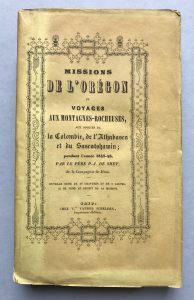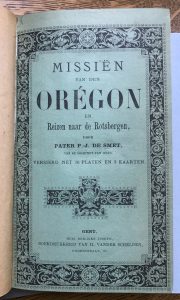New Acquisition: De Smet’s Missions de l’Orégon, 1848
A rare uncut edition of Jesuit priest Pierre-Jean De Smet’s Missions de l’Orégon et Voyages dans les Montagnes Rocheuses aux sources de la Columbie, de l’Athabasca et du Sascatshawin, en 1845-1846 (Gand [Ghent]: Vander Schelden, 1848) has been added to the Oregon Collection in Special Collections and University Archives. This collection includes published materials that reflect the history, literature, and life in Oregon and the Oregon Territory. The acquisition of Missions de l’Orégon broadens the De Smet holdings in the Oregon Collection and complements other editions held in the collection including the English-language edition (Oregon Missions) and the Flemish-language edition (Missiën van den Orégon, seen on the right below).
Pierre-Jean De Smet (1801-1873) was born in Belgium and emigrated to the United States in 1821 as a novitiate of the Society of Jesus (Jesuits). He moved to a Jesuit mission in Florissant, Missouri, near St. Louis, and began to study the languages and cultures of Native Americans. He went on first his mission among the Salish after they sent a deputation to St. Louis. De Smet returned with the messengers travelling west through Montana and Wyoming, also visiting the neighboring Nez Perce nation on this journey. In 1845-1846, De Smet undertook one of his longest missions throughout the Rocky Mountains and the Oregon Territory, including the Columbia and Willamette valleys, where he established schools and missions throughout. After these travels, De Smet published an account of the evangelizing expedition in Oregon Missions and Travels over the Rocky Mountains in 1845-46 (New York, 1847). The sale of this book, published in three languages, was part of his continued effort to raise money for Jesuit missions in the Northwest. These fundraising labors included many overseas trips to Europe to meet with papal and European state leaders where his translated books might illustrate his mission and impact to European donors. De Smet saw himself as an ally and advocate of the tribes he was in contact with in the West and was aware of the infringements and persecutions of the federal government toward tribal nations writing, “If our Indians become enraged against the whites, it is because the whites have made them suffer for a long time.”



